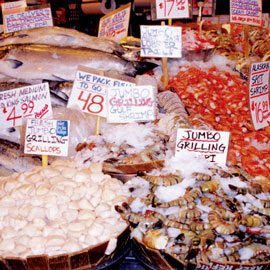 How to make healthy choices when buying fish for your reflux-reduction diet.
How to make healthy choices when buying fish for your reflux-reduction diet.
There are plenty of fish in the sea, but this also applies to the supermarket, causing a great deal of confusion for many consumers. As if deciding whether or not to buy organic produce isn’t complex enough, fish choices present shoppers with all kinds of questions they may not have the answers to. Should you buy farmed fish or wild caught? What exactly is mercury contamination?
For those who suffer from the symptoms of acid reflux in Macon, fish may be one of the best sources of protein, providing a low-fat alternative for people who have reflux symptoms triggered by fatty foods. The fats they do contain are the good kind—omega-3 fatty acids can provide you with a wide range of health benefits from protection against heart disease to the relief of inflammation. However, if you find yourself constantly walking away from the fish counter empty-handed, it may help to address the questions above and make fish as beneficial a part of your diet as possible.
Farm-Raised or Wild Caught?
Though salmon is frequently touted for its nutritional value, many environmental groups warn of the negative impacts that farmed salmon can have on natural ecosystems. They also warn that farm-raised salmon can contain high levels of PCBs, a group of manmade organic chemicals used in numerous products and materials until banned for their toxicity in 1979. PCBs do not break down easily, meaning that they still remain in many parts of the environment and may travel long distances, cycling between soil, air and water. They often accumulate in the bodies of small organisms like fish and may cause cancer or other issues in the immune, nervous, endocrine and reproductive systems.
Though fish farming, or aquaculture, can help to create a more sustainable source of fish and reduce the impact of fishing in the ocean, the actual impact and healthiness of farmed fish varies widely based on methods, location and species. Monterey Bay Aquarium, a respected and popular aquarium in Monterey California, has compiled a guide for which fish are safest and most environmentally-friendly in each region of the United States. For residents in Macon and the rest of the Southeast, here are some fish that are generally considered safe to buy farm-raised:
- Catfish
- Baramundi
- Tilapia
- Rainbow trout
- Arctic char
What is Mercury Contamination, Anyway?
Due to pollution, mercury is commonly found as a contaminate in many waters. Though recent safeguards for clean air may reduce mercury pollution from power plants, measures for reducing industrial mercury pollution from some other sources have become deadlocked, meaning that mercury contamination will continue to be an issue for years to come.
Exposure to mercury is considered most dangerous for children and pregnant women, but can pose a serious threat to any human. Mercury acts as a neurotoxin when it enters the body, attacking the brain and nervous system. For adults, this can mean adverse effects for blood pressure regulation, vision and memory, while mercury poisoning in children can wreak havoc on their developing minds, resulting in learning disabilities and a delayed ability to walk and talk.
After entering a waterway due to industrial pollution, mercury is broken down by natural bacteria and works its way up the food chain as large fish eat smaller ones. Mercury doesn’t break down throughout this process—instead, it slowly accumulates, meaning that larger fish like tuna, shark and swordfish can continue to increase their concentrations of mercury until they reach more than 10,000 times that of their surrounding habitats.
Monterey Bay Aquarium’s Seafood Watch Guide suggests avoiding the following fish due to their high potential for contamination by mercury or other pollutants:
- Grouper
- Blue Striped Marlin
- Sharks
- Swordfish
- Bluefin, Bigeye and Yellowfin Tuna
Though fish can be an important part of your diet to reduce acid reflux symptoms, buying the wrong kind of fish could be harmful for your body and the environment. Use this article as a starting point in educating yourself in healthy fish purchases and head to Monterey Bay Aquarium’s Seafood Watch page for more information. Remember: one of the best ways to make sure your food is healthy is to know where it came from.

Leave a Reply